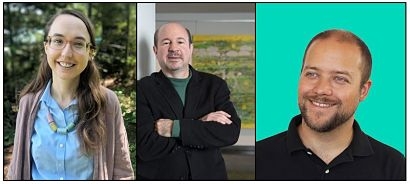
One of the most common questions among dismayed viewers of the movie is why Gibbs and Moore decided to make such a film in the first place.
Leah: I think that Jeff Gibbs was working on this film for a really long time. I certainly noticed that it is really out of date. So I think he was starting a film in around 2010 or 2012, a while ago, and he just collected footage, and when Michael Moore went on as co-producer to promote it on Earth Day, he mentioned that they just edited together during the coronavirus pandemic because they were at home and so thought ‘Let’s just get this movie done’ and just put it out into the world. I think it was just a rush-job. They just wanted to ... take on the idea that certain renewables are bad and that the climate movement is somehow corrupt.
A lot of people will say Michael Moore is narcissistic, so I think they were just moving in a bubble with themselves saying ‘Let’s put this together and we’ll get a lot of attention’ and ‘climate change is a hot topic right now so we’ll do our take on it and tell everybody that they’re wrong’, which is a very Michael Moore thing to do..
Michael: What I can tell you is that it’s a great way for an increasingly irrelevant filmmaker to try to jump-start his career at the expense of our planet.
What were your first thoughts as you started to watch it?
Leah: I first saw an article about it on the eve of Earth Day. And I read the article and it sounded really bad, about how renewables were bad and the interest in population control. For those of us who have been working in climate policy for a while, I’ve been doing this for 15 years, those are really problematic things to be pushing towards the general public. All of us know there are trade-offs.
In the UK there was this wonderful academic, David MacKay, he was a really brilliant person who wrote this brilliant book called Sustainable Energy – Without The Hot Air, and he did all these things with the British Government about all the transition paths in the UK.
Mackay didn’t come to the conclusion that renewables are some magical solution – he was actually pro-nuclear. My point is that we know there are trade-offs and that renewables are not perfect, that there are some downsides, but the film makes it look like that intermittency was somehow discovered by them [Gibbs and Moore]. When you look at then versus now, a lot of progress has been made on the intermittency problem, whether that’s transmission or batteries at the grid scale or having renewable energy sites built in a broader area so that they balance one another. A lot of these things are actually being dealt with as the clean energy transition accelerates, and so to me, if you want to have a critique of renewables, you can do that, but that’s not what this film did. It did not actually go out to talk to experts or to get up-to-date information or to talk about some of the tensions and trade-offs. It seems like Jeff Gibbs just went round talking to random people and collected random thoughts over the last decade, and slapped it together, with his prefabricated ideas. The thesis was against renewable from the beginning.
When it comes to population control that’s a very racist thing to promote. In the US, groups that advocate that are classified as hate groups because they’re also often anti-immigration. White people, who are wealthier on average, are already having fewer children and it’s people in the developing world, who are usually people of colour, who are having more children, partly because they haven’t developed, they haven’t the same industrialisation and yet the film is saying that industrialisation is evil, right, any kind of progress is evil, and also population control is the answer. So that makes absolutely no sense. If they had talked to any expert, they would have understood that is a really problematic solution to be pushing to this problem.

Leah Stokes
What do you think are the main errors in the movie and the most damaging, in terms of the impact the movie is now having on the world?
Leah: I think it’s a very nihilistic film. When you think about it, these are two people, probably in their 60s, white men, who have an enormous amount of privilege, near the end of their lives, and so they can just sit around and say we’re screwed and there’s nothing to be done about it and that’s perfectly fine for them. But there are lots of young people, including women, including diverse people, who have to live in the world that’s coming and have to solve the problems we’ve been handed from people in Michael Moore’s and Jeff Gibb’s generation. So it does absolutely nothing to help solve the problem of climate change and it provides no solutions, no sense of hope, no possibilities. For young people, I think that is extremely irresponsible, particularly when the climate movement at this point has actually been making progress.
Michael: The film presents a distorted and outdated depiction of the renewable energy industry in an effort to malign renewable energy thus ironically promoting the agenda of the fossil fuel industry.
The most egregious is the completely false assertion that biomass burning is a larger producer of carbon pollution than coal or natural gas. In fact, it produces a tiny fraction as much carbon pollution (burning biomass is carbon neutral—it’s only with refining and transportation that, like any energy source, some carbon is emitted because we have a largely fossil fuel-driven electricity grid and transportation system). They also misrepresent biomass and wood chips - these are a by-product of forestry. Trees aren’t literally cut down to make wood chips. And much biomass - e.g. organic waste - has nothing to do whatsoever with trees or deforestation. Their misrepresentations of wind and solar are every bit as bad, and this has been detailed in a number of pieces, for example by Ketan Joshi and Leah Stokes (in Vox).
Zeke: It provides an outdated, misguided, and often simply incorrect critique of clean energy while letting the actual drivers of climate change – fossil fuels – largely off the hook.
The claim that renewables take more emissions to produce than they reduce over their lifetimes is staggeringly inaccurate. Renewables are responsible for around 20 times less greenhouse gas emissions than coal for every kWh of electricity they generate – even accounting for all the energy used in mining, transport, assembly, etc. Gibbs and Moore completely ignore hundreds of peer-reviewed studies published by researchers over the last two decades and simply present this falsehood as fact with no supporting evidence.
Its reached a very wide audience and spread falsehoods about the best way we have to combat climate change – to replace fossil fuels with clean energy.
Alongside all the errors, it is notable that the film makes no mention whatsoever of fossil fuel corporations, why do you think that is?
Zeke: No idea. Perhaps they went into the production with the narrative outcome predetermined (Gibbs in particular has been attacking renewables for decades) and simply sought out fringe views to reinforce their preconceptions.
Michael: I can’t read Moore's mind. I can tell you that he creates a straw man that advances the narrative of the forces of climate inaction. Why he’s done that, I have no idea.

Michael Mann
Leah: Yeah I think that’s really crazy. Contrast this documentary with “Merchants of Doubt”. Both these films about climate change are based on a book. One of them is based on a very sad book called Green Illusions by a fairly local scholar [referring to Ozzie Zehner] who, well, I’ve never heard of him and he’s not within the academic community of people doing serious research on the topic. Merchants of Doubt was based on a book by Naeomi Oreskes and Eric. M. Conway that was really well researched. After that book was published, Naomi Oreskes got hired by Harvard University right? It was extremely well done work and it focuses on climate change denial that is being pushed by the fossil fuel industry, which is the way they make profit right?
The weirdest thing about this film is that it says the climate movement is corrupted by corporations, but it doesn’t say which corporations? And how come they never talk about the corporations themselves? Whenever these people [appear], somebody called them ‘first time climate guys’, they’re usually white men who have no background in the topic and they come to climate change and think they’re going to give us some new take. There’s absolutely nothing about climate change denial in this film. I think that’s extremely irresponsible, because this film is doing exactly what climate change deniers do. It is spreading misinformation and leading to delay in solving the problem. It’s very irresponsible.
Ozzie Zehner’s book is the entire basis of the film. He’s not a real scholar. He’s got STS – Science Technology Studies – a very critical branch, almost like anthropology, all about critical takes on things. This is not somebody you’d meet in discussions about policy or the latest technology or progress need in interconnections or batteries. It’s not like they went to the national lab [National Renewable Energy Laboratory (NREL) operated by the Department of Energy] that is trying to do things in honest ways. No, they went to a person who is not really an expert. And everyone in the film is not really an expert. I have not heard of anyone in the film. These are not climate experts, or energy experts. They are really not. But this didn’t really matter to them.
That footage in the film, it’s quite out of date. So when they go to the Daggett solar plant in Southern California, a Concentrated Solar Power (CSP) plant repowered sometime in the last decade, so Moore, Gibbs and Zehner go to the site and they claim it’s all broken and whatever, we don’t when they were doing this footage. You can go to Google Earth or Google Maps and see on the satellite picture that it’s all new, today, it’s just that it’s been repowered.
Clearly their footage is quite old and they’ve made very little attempt to update it with whatever’s been happening, whether that’s efficiency increases or cost decline. Two years ago, you could buy an EV in the US and it would be cleaner than a new gas-powered car, not an old one, a new one. But they pretend that EVs are not clean. We could have clean air every single day if we used electric vehicles rather than combustion engine cars, but that message is completely muddied by this film because they’ve used out of date information about the grid that the EVs are being charged on.
Then there’s that scene where Gibbs interviews a group of local people with clear “not-in-my-backyard” (NIMBY) views.
Leah: I’ve done a lot of research on NIMBYs. It’s a big area of my work. I did it in Canada, in an area where, like the UK, it completely overturned the policy. You get the same impression with Vermont with the anti-biomass people. The reality is that the clean energy transition is going to be really hard, and I think a lot of people don’t understand that. One of the big areas is going to be local opposition and when a film like this comes out it just fuels more of that. If you talk to NIMBYs and look at the kind of stuff they put out, they trade a lot in false information, for example this idea that wind is not clean and it’s not going to displace fossil fuels. In the short term that may be true, but in the long term it’s not true at all. In the long term, we’ll build an entire system that’s based on clean energy, and we need the public support to get that transition done. This kind of film erodes that.

Zeke Hausfather
And then there’s the more complicated topic of biomass. One particular group that has been particularly active in this area has been Biofuelwatch, who have focused particularly on the clearance of southern US forests for wood chips that are then sent to the European Union (EU). Are they correct in their concerns?
Leah: Yeah, that is very problematic and that’s real. But the reality is that the film does not explain that and also, environmental groups have been fighting that tooth and nail. Basically the way that the EU system works, there’s a renewable energy directive, all these incentives policy-wise in the European Union to increase renewables. The EU doesn’t have an enormous amount of wood products. So, just like oil is shipped around the world, there is an increasing emphasis on shipping wood chip products from North America to Europe to burn in plants. That isn’t a great thing to do because it takes a lot of energy to move all that wood from North America to Europe. So if you think of the lifecycle impact of that, it would be bad.
Biomass works well when it’s usually a local source. I was talking to someone yesterday and he said something like a maximum of 50 miles. With the EU, I think if we were going to expand that biomass a lot, I think we would run into problems. It would mean more and more land to have forests and then burn them. That’s not great.
What kind of damage has the film done to climate action and the clean energy industry? And how can this be addressed and countered?
Michael: It serves as a wedge to divide the environmental community when the forces of denial and delay, i.e. the fossil fuel industry and the powerful right-wing interests doing their bidding—are completely unified, and have the power of the executive branch of our government currently behind them. It hurts the very people that Moore claims to care about and advances the agenda of the rich and powerful that he purports to oppose.
Leah: I have no interest of taking on Michael Moore or climate change deniers or NIMBY groups or whoever, but I feel that it is wrong the way environmental groups are portrayed [in this movie] and its wrong the way that the energy transition was portrayed and so I have a responsibility, because I know a lot of the researchers involved, to try and clarify the facts. If you want to write a critical take on renewables, you can do that. It’s not that that’s not doable, but that’s not what this film did. It didn’t engage with good faith, it didn’t engage in facts or accuracy, so I think a lot of us have to now do what we can to try and correct the record. It disturbs me how little climate information and education people have so that they can’t even distinguish between facts and lies. So, those of us who can distinguish have a great responsibility to do so.
For additional information:

